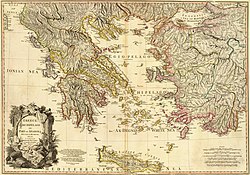| History of Greece |
|---|
 |
|
|
The Greeks (Greek: Έλληνες) have been identified by many ethnonyms. The most common native ethnonym is Hellene (Ancient Greek: Ἕλλην), pl. Hellenes (Ἕλληνες); the name Greeks (Latin: Graeci) was used by the ancient Romans and gradually entered the European languages through its use in Latin. The mythological patriarch Hellen is the named progenitor of the Greek peoples; his descendants the Aeolians, Dorians, Achaeans and Ionians correspond to the main Greek tribes and to the main dialects spoken in Greece and Asia Minor (Anatolia).
The first Greek-speaking people, called Myceneans or Mycenean-Achaeans by historians, entered present-day Greece sometime in the Neolithic era or the Bronze Age. Homer refers to "Achaeans" as the dominant tribe during the Trojan War period usually dated to the 12th–11th centuries BC,[1][2] using Hellenes to describe a relatively small tribe in Thessaly. The Dorians, an important Greek-speaking group, appeared roughly at that time. According to the Greek tradition, the Graeci (Latin; Ancient Greek: Γραικοί, Graikoi, "Greeks") were renamed Hellenes probably with the establishment of the Great Amphictyonic League after the Trojan War.
When the Romans first encountered Greek colonists in Southern Italy, they used the name Graeci for the colonists and then for all Greeks; this became the root of all relevant terms in European languages. The Persians used the name Yaunas (Yunans) after the Ionians, a Greek tribe who colonized part of the coasts of western Asia Minor.[3] The term was used later in Hebrew (Yevanim, יוונים), Arabic, and also by the Turks. The word entered the languages of the Indian subcontinent as the Yona. A unique form is used in Georgian, where the Greeks are called Berdzeni (ბერძენი).
By Late Antiquity (c. 3rd–7th centuries), the Greeks referred to themselves as Graikoi (Γραικοί, "Greeks") and Rhomaioi/Romioi (Ῥωμαῖοι/Ῥωμηοί/Ρωμιοί, "Romans") the latter of which was used since virtually all Greeks were Roman citizens after 212 AD. The term Hellene started to be applied to the followers of the polytheistic ("pagan") religion after the establishment of Christianity by Theodosius I.
- ^ C. Mossé. (1984). La Grèce archaïque d'Homère à Eschyle. Editions du Seuil, Paris, p. 12.
- ^ Those who believe that the stories of the Trojan War are derived from a specific historical conflict usually date it to the 12th or 11th centuries BC, often preferring the dates given by Eratosthenes, 1194–1184 BC, which roughly corresponds with archaeological evidence of a catastrophic burning of Troy VIIa.
- ^ Johannes Engels (2010). "Macedonians and Greeks". In Joseph Roisman and Ian Worthington's A Companion to Ancient Macedonia, Oxford, Chichester & Malden: Wiley-Blackwell, pp. 81–98.